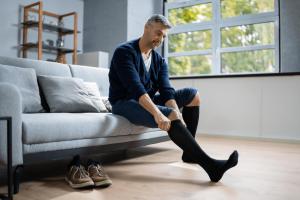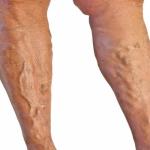
Blood clots can be serious. These gel-like clumps can block blood flow and impact your heart, lungs, brain, and other major organs, and, in rare cases, be fatal.
Clots can form almost anywhere in the body. If you have a blood clot in your veins, you might develop venous conditions, such as deep vein thrombosis (DVT) or a venous ulcer. Vein treatments for varicose and spider veins can reduce your risk of developing a clot.
Book A Treatment Option Consulation
In addition to medical treatment, there are ways to dissolve blood clots naturally. With a few lifestyle and dietary changes, you can help prevent blood clots from forming and reduce them, supporting your overall vein health.
How to Reduce Blood Clots Naturally with Lifestyle Changes
There are many possible causes of blood clots. Sitting for long periods, smoking, surgery, and varicose veins can all increase your chances of developing a clot in your veins or arteries. If one forms in a vein, it can be particularly dangerous as venous clots don’t dissolve easily.
When looking at how to prevent blood clots naturally, the goal is to improve blood circulation and prevent more platelets, proteins, and cells in the blood from sticking together. All of the following lifestyle changes can help keep your blood flowing easily and reduce the chances of developing a clot.
Exercise Regularly
Physical activity boosts circulation and prevents clotting by building up plasma in the blood, which helps to thin the blood in a healthy way.
How much exercise do you need to help dissolve blood clots naturally? Walking daily can help to support healthy blood circulation. You can also enjoy swimming or water aerobics to get your blood flowing.
Minimize Sedentary Time
Remaining sedentary for long periods of time can lead to poor circulation in your legs, which can increase your risk of a blood clot. Try to get up and walk around if you’re sitting down for more than 30 minutes at a time.
Stay Hydrated
Drinking water helps to thin your blood, allowing it to travel easily through your veins and arteries. You get some fluid from the food you eat, as well as juices and other liquids. It’s also a good idea to aim for six to eight glasses of water a day.
Lose Weight
The risk of forming blood clots in your legs increases with obesity. Researchers know that people who are overweight tend to have higher blood pressure, which can create an inflammatory effect, damaging vein walls and increasing clotting.
By maintaining a healthy weight, you alleviate some of that pressure on your veins and keep your clot risk lower.
Wear Compression Stockings
If you’re wondering how to prevent DVT and other blood clots in the legs, there is evidence that compression stockings are effective. They put graduated pressure on the leg, with the most pressure at the ankle. This helps to move blood from surface veins to deep veins and back to the heart.
Our doctors often recommend compression stockings to our patients to improve blood circulation.
Foods That Naturally Dissolve Blood Clots
Our vein doctors usually recommend a healthy diet, as well, as what you eat can also help to dissolve existing blood clots and prevent new ones from forming.
There are several foods that act as natural blood thinners. The following are foods that naturally dissolve blood clots, which you can add to your diet or take in supplement form:
- Ginger — contains a compound called gingerol, which stops platelets in the blood from sticking together
- Garlic — contains allicin, a compound that is known to act as a natural blood thinner
- Tumeric – contains curcumin, which has anti-inflammatory and anti-coagulant properties
- Cayenne pepper — contains capsaicin, which helps to stop blood clots from forming
Foods high in vitamin E, such as sunflower seeds, almonds, spinach, mango, and pumpkin can also help prevent blood clots. Vitamin E has natural anti-coagulant properties.
How Long Does It Take a Blood Clot to Dissolve Naturally?
It can take anywhere from weeks to months for a blood clot to dissolve on its own. As venous clots can be dangerous, they’re not something you should leave unaddressed.
If you’re concerned that you might have a blood clot, it’s important to see a doctor. Natural remedies can help prevent blood clots, but you might need other treatments to protect your health, such as blood-thinning medications or vein treatments.
If you have vein disease, the underlying cause of varicose veins, you have a higher risk of developing a clot in a deep vein. A vein specialist at one of our outpatient clinics can examine and diagnose any existing vein issues. They’ll also create a personalized treatment plan to help protect your venous health.
Are you worried you may be experiencing signs of a blood clot? Schedule a consultation with a vein specialist near you at USA Vein Clinics.
Medically Reviewed By:
Dr. Yan Katsnelson is a philanthropist, business owner, and highly skilled cardiac surgeon. He is the Founder and CEO of USA Vein Clinics, which is part of USA Clinics Group, the parent company of USA Fibroid Centers, USA Vascular Centers, and USA Oncology Centers, with more than 100 facilities nationwide. Dr. Yan has established himself as a strong advocate for accessibility and affordability of the most advanced medical care close to home. His mission is to create a positive experience for each patient with compassionate, personalized, and expert care.








